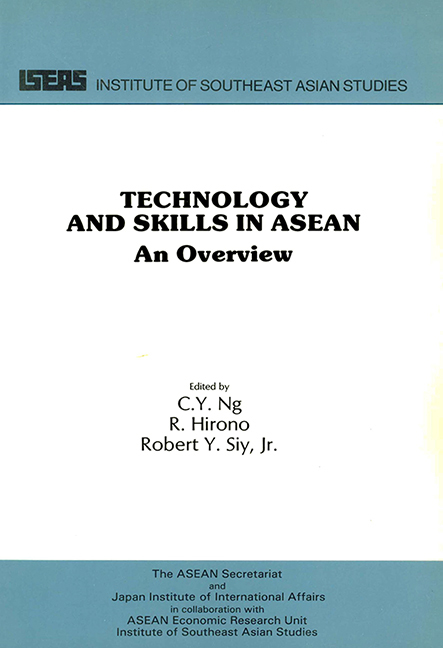Book contents
- Frontmatter
- Contents
- Foreword
- Preface
- PART ONE ASEAN OVERVIEW
- Introduction
- 1 Industrialization in ASEAN
- 2 Technology Transfer, Adaptation and Diffusion in Asean: Problems and Issues
- 3 Science and Technology Policies in Asean
- 4 The Experience From Selected Asean Industries
- 5 Conclusions and Recommendations
- PART TWO SECTION 1: JAPANESE OVERVIEW
- PART TWO SECTION 2: JAPANESE EXPERIENCES IN TECHNOLOGY TRANSFER
- The Editors
Introduction
from PART ONE - ASEAN OVERVIEW
Published online by Cambridge University Press: 09 November 2017
- Frontmatter
- Contents
- Foreword
- Preface
- PART ONE ASEAN OVERVIEW
- Introduction
- 1 Industrialization in ASEAN
- 2 Technology Transfer, Adaptation and Diffusion in Asean: Problems and Issues
- 3 Science and Technology Policies in Asean
- 4 The Experience From Selected Asean Industries
- 5 Conclusions and Recommendations
- PART TWO SECTION 1: JAPANESE OVERVIEW
- PART TWO SECTION 2: JAPANESE EXPERIENCES IN TECHNOLOGY TRANSFER
- The Editors
Summary
The research studies focused on the problem of identifying effective mechanisms for raising the levels of technology transfer and skills development in the ASEAN countries. This concern stemmed from the recognition that technology is a key factor in national development efforts, both in the West and in the East, and that sustained technological advancement is urgently needed in order for national economies to industrialize, and more broadly, to modernize.
Except for Singapore, all the other ASEAN nations are basically agricultural countries, relying in the main on the export of primary commodities for the earning of foreign exchange. However, given the fluctuating international demand for primary commodities, these countries have all embarked upon industrialization programmes with a view to reduce dependence on primary exports, and to increase income and employment opportunities of their expanding labour force.
Beginning from the early 1970s, the industrialization process in the whole of ASEAN was given a major boost when many multinational electronics firms decided to locate their offshore assembly operations in this region. Among the factors that led to this relocation were the stable political climate, generous investment incentives, relatively good infrastructure, low wages, a docile labour force, and subdued trade union activity.
During the decade of the 1970s and right through to the early eighties, the electronics industry attained impressive growth rates. As a result, its output as a percentage of total manufacturing output increased substantially and a significant proportion of manufacturing exports from ASEAN consisted of electronic products. The labour-intensiveness of the industry also led it to become one of the largest, if not the largest, single absorber of labour in the manufacturing sector in this region.
While the contribution of the electronics industry to growth and employment generation was impressive, its effectiveness in the transfer of technology and the upgrading of skills was more doubtful. Concerned that the manufacturing sector should continuously upgrade its technical skills, the ASEAN governments exhorted multinational corporations (MNCs) from technologically advanced countries such as Japan and the United States to devote attention to the development of the technological capacities in their host country staff.
- Type
- Chapter
- Information
- Technology and Skills in ASEANAn Overview, pp. 3 - 6Publisher: ISEAS–Yusof Ishak InstitutePrint publication year: 1988

